Winter is here! Check out the winter wonderlands at these 5 amazing winter destinations in Montana
- Travel Tips

What Is A DMO In Tourism
Published: December 12, 2023
Modified: December 28, 2023
by Renata Smyth
- Plan Your Trip
- Travel Guide
Introduction
When it comes to planning a trip or exploring a new destination, one of the first things travelers often turn to is a Destination Management Organization (DMO) for guidance and information. But what exactly is a DMO and what role do they play in the tourism industry? In this article, we will delve into the world of DMOs and uncover their significance in promoting and developing tourism.
A DMO can be defined as a body or organization that is responsible for overseeing and coordinating tourism initiatives in a specific destination. Its primary purpose is to attract visitors, drive tourism growth, and ensure the overall success and sustainability of a destination. DMOs work closely with various stakeholders, including government agencies, local businesses, tourism operators, and community organizations to create a unified approach towards destination management.
The main function of a DMO is to market and promote the destination to potential travelers. They act as the official representative of the destination, disseminating information about attractions, accommodations, activities, and events through various channels such as websites, social media, brochures, and tourism campaigns. By effectively showcasing the unique features and experiences a destination has to offer, DMOs inspire and motivate travelers to choose their destination over others.
Definition and Role of a DMO in Tourism
A Destination Management Organization (DMO) plays a vital role in the tourism industry by serving as the primary entity responsible for managing, promoting, and developing a destination. DMOs are typically non-profit organizations or government agencies that work towards enhancing the overall visitor experience and driving economic growth through tourism.
The primary role of a DMO is to act as a strategic partner and advocate for the destination. They collaborate with various stakeholders, such as local businesses, government bodies, community organizations, and tourism operators, to create a cohesive and unified approach towards destination management.
One of the key functions of a DMO is destination marketing. They are responsible for promoting the unique features, attractions, and experiences of a destination to potential visitors. This involves creating compelling marketing campaigns, developing informative content, utilizing digital platforms, and participating in trade shows and tourism events to attract and engage travelers.
Additionally, DMOs play a crucial role in destination development. They work with local communities and businesses to identify and develop tourism products and experiences that align with the destination’s strengths and market trends. This can include developing new attractions, improving infrastructure, enhancing visitor services, and supporting sustainable tourism practices.
Another significant aspect of a DMO’s role is destination research and planning. They gather and analyze data on visitor demographics, travel trends, market demand, and visitor satisfaction to make informed decisions and develop effective strategies. This research helps DMOs identify target markets, understand consumer preferences, and tailor marketing campaigns to attract the right audience.
A DMO also acts as a facilitator and coordinator for various events and initiatives within the destination. They collaborate with event organizers, tourism operators, and local organizations to plan and execute events, festivals, conferences, and other tourism-related activities. By organizing these events, DMOs contribute to the cultural and economic vibrancy of the destination, while also attracting visitors and generating revenue.
In summary, a DMO is an essential player in the tourism industry, working tirelessly to promote, develop, and manage a destination. Their role encompasses destination marketing, development, research, planning, and event coordination. By effectively fulfilling their responsibilities, DMOs contribute to the growth, sustainability, and success of a destination’s tourism sector.
Functions and Responsibilities of a DMO
A Destination Management Organization (DMO) is tasked with a range of important functions and responsibilities to ensure the successful management and promotion of a destination. Let’s explore some of the key functions and responsibilities fulfilled by DMOs:
- Destination Marketing: One of the primary responsibilities of a DMO is destination marketing. They are responsible for showcasing the unique attractions, experiences, and offerings of a destination to attract visitors. This involves developing marketing campaigns, creating promotional materials, and leveraging various channels such as websites, social media, and travel trade shows to reach a wide audience.
- Visitor Information Services: DMOs serve as a central hub for visitor information. They provide up-to-date and accurate information about the destination, including attractions, accommodations, transportation options, dining, and events. DMOs may operate visitor information centers, maintain informative websites, and offer assistance through email, phone, or chat services to ensure that visitors have access to the information they need.
- Tourism Development: DMOs play a crucial role in the development of the tourism industry within a destination. They work closely with local businesses, communities, and government agencies to identify opportunities for tourism growth. DMOs may support the development of new tourism products and experiences, provide guidance on infrastructure development, and facilitate collaboration between stakeholders to maximize the potential of the destination.
- Research and Planning: DMOs conduct research and analyze data to gain insights into the tourism market and visitor preferences. This includes collecting and analyzing visitor demographics, market trends, and visitor satisfaction data. By understanding the needs and expectations of travelers, DMOs can develop effective marketing strategies, identify target markets, and make informed decisions to enhance the visitor experience.
- Collaboration: DMOs foster collaboration among various stakeholders in the tourism industry. They work closely with local businesses, government agencies, community organizations, and tourism associations to develop partnerships and address common challenges. This collaboration ensures a coordinated and unified approach towards destination management, leading to enhanced visitor satisfaction and sustainable tourism development.
- Event and Conference Planning: DMOs often play a role in planning and organizing events, conferences, and festivals within the destination. These events not only attract visitors but also contribute to the destination’s cultural vibrancy and economic growth. DMOs may work with event organizers, secure funding, coordinate logistics, and promote the event to a wider audience to ensure its success.
- Sustainability and Responsible Tourism: DMOs are increasingly prioritizing sustainability and responsible tourism practices. They work to minimize the negative impacts of tourism on the environment, culture, and local communities. DMOs may implement initiatives such as waste management programs, support local and eco-friendly businesses, promote responsible tourism practices among visitors, and educate stakeholders about the importance of sustainable tourism.
These functions and responsibilities highlight the diverse and crucial role that DMOs play in managing and promoting a destination. By effectively fulfilling these responsibilities, DMOs contribute to the growth, sustainability, and success of the tourism industry in their respective destinations.
Importance of DMOs in Tourism Development
Destination Management Organizations (DMOs) play a pivotal role in the development of the tourism industry. Their efforts and initiatives have a significant impact on the growth, sustainability, and success of a destination. Let’s explore the importance of DMOs in tourism development:
- Strategic Planning: DMOs engage in strategic planning by conducting research, analyzing data, and identifying market trends. This enables them to develop effective strategies that align with the destination’s unique strengths and target the right audience. Strategic planning helps to maximize the destination’s tourism potential and drives sustainable growth.
- Destination Marketing: DMOs are responsible for marketing and promoting the destination to potential visitors. Through targeted marketing campaigns, digital platforms, and trade shows, DMOs showcase the destination’s attractions and experiences. Effective destination marketing not only attracts more tourists but also generates economic benefits for businesses and local communities.
- Economic Impact: The tourism industry has a significant economic impact, contributing to job creation, revenue generation, and regional development. DMOs facilitate tourism growth by collaborating with local businesses and supporting the development of tourism products and experiences. This leads to increased visitor spending, business opportunities, and overall economic prosperity in the destination.
- Enhanced Visitor Experience: DMOs strive to enhance the visitor experience by providing information, assistance, and support to tourists. They promote visitor-friendly services, ensure the availability of quality accommodations, and collaborate with local communities to offer authentic and enriching experiences. By focusing on the visitor experience, DMOs encourage repeat visits, positive reviews, and word-of-mouth recommendations, ultimately boosting the destination’s reputation.
- Destination Differentiation: In a competitive global tourism market, DMOs play a vital role in differentiating their destination from others. By highlighting unique features, cultural heritage, natural beauty, and authentic experiences, DMOs create a distinct identity for the destination. This differentiation attracts niche markets and positions the destination as a must-visit location, setting it apart from competitors.
- Sustainable Tourism: DMOs have a responsibility to promote and practice sustainable tourism. They work towards minimizing negative environmental and socio-cultural impacts while maximizing the positive benefits of tourism. By supporting eco-friendly initiatives, promoting responsible tourism practices, and engaging with local communities, DMOs contribute to the long-term sustainability of the destination.
- Stakeholder Collaboration: DMOs serve as a platform for collaboration and coordination among various stakeholders in the tourism industry. They bring together local businesses, government agencies, community organizations, and tourism operators to work collectively towards the development and management of the destination. This collaboration ensures a unified approach, enhances the destination’s competitiveness, and fosters a sense of community ownership.
The importance of DMOs in tourism development cannot be overstated. From strategic planning to destination marketing, economic impact to sustainable tourism practices, DMOs play a vital role in shaping the growth, sustainability, and success of destinations around the world.
DMOs and Destination Marketing
Destination Management Organizations (DMOs) play a crucial role in destination marketing. They are responsible for showcasing the unique attractions, experiences, and offerings of a destination to attract and engage potential visitors. Let’s explore how DMOs contribute to destination marketing:
Strategic Planning: DMOs engage in strategic planning to develop marketing strategies and campaigns that align with the destination’s goals and target markets. They conduct market research, analyze visitor trends, and identify the unique selling points of the destination. By understanding the target audience and market demand, DMOs can develop compelling marketing messages and initiatives that resonate with potential visitors.
Brand Development: DMOs are instrumental in developing and promoting the destination’s brand. They work to create a distinct identity that sets the destination apart from others in the highly competitive tourism industry. DMOs ensure that the destination’s brand reflects its unique culture, natural beauty, history, and experiences. Through consistent branding, DMOs create a recognizable and compelling image that attracts and resonates with travelers.
Content Creation: DMOs generate high-quality content to inform, inspire, and engage potential visitors. They produce a wide range of content, including website articles, blog posts, social media updates, videos, and photography. This content highlights the destination’s key attractions, activities, cultural experiences, and events. By providing valuable and engaging content, DMOs capture the attention of potential travelers and motivate them to choose the destination.
Marketing Collateral: DMOs create and distribute marketing collateral to promote the destination. This includes brochures, maps, visitor guides, and promotional materials. These materials provide comprehensive information about the destination’s attractions, accommodations, dining options, and transportation. DMOs ensure that the marketing collateral is readily available and easily accessible to potential visitors through visitor centers, travel agencies, trade shows, and digital platforms.
Online Presence: DMOs leverage digital platforms to reach and engage a global audience. They maintain informative and user-friendly websites that serve as a centralized resource for destination information. DMOs optimize their websites for search engines, ensuring that potential visitors can easily find relevant information. They also utilize social media channels, email marketing campaigns, and online advertising to promote the destination’s unique offerings, events, and deals.
Partnerships and Collaboration: DMOs collaborate with various stakeholders within the tourism industry to amplify their marketing efforts. They work with local businesses, tourism operators, hotels, restaurants, and attractions to develop cooperative marketing campaigns. By forming partnerships and engaging in cross-promotion, DMOs expand the reach of their marketing initiatives and create a cohesive and compelling message about the destination.
Trade Shows and Events: DMOs participate in trade shows, tourism fairs, and events to showcase the destination to travel industry professionals and potential visitors. They create visually appealing booths, provide informative materials, and engage in face-to-face interactions. These events offer DMOs the opportunity to network, establish connections, and market the destination to a wide range of stakeholders.
In summary, DMOs play a vital role in destination marketing. Through strategic planning, brand development, content creation, and online presence, DMOs effectively promote the unique offerings of the destination. By collaborating with stakeholders and participating in trade shows and events, DMOs amplify their marketing efforts and ensure that the destination stands out in the competitive tourism industry.
Collaboration between DMOs and Other Stakeholders
Collaboration is essential for the success of Destination Management Organizations (DMOs). DMOs work closely with various stakeholders, including government agencies, local businesses, tourism operators, and community organizations, to achieve the common goal of promoting and developing the destination. The collaboration between DMOs and other stakeholders brings numerous benefits and ensures the overall success of tourism initiatives. Let’s explore the importance of this collaboration:
Marketing and Promotion: DMOs collaborate with local businesses, tourism operators, and attractions to showcase the destination’s offerings. By partnering with these stakeholders, DMOs gain access to unique experiences, accommodations, and attractions that can be featured in their marketing efforts. This collaboration enhances the marketing material’s authenticity and attractiveness, enticing potential visitors to choose the destination.
Product Development: Collaborating with local businesses and tourism operators allows DMOs to identify and develop new tourism products and experiences. By working together, stakeholders can assess market demand, identify gaps, and create innovative offerings that align with the destination’s strengths. This collaboration not only enhances the destination’s competitiveness but also provides visitors with unique and memorable experiences.
Infrastructure and Investment: DMOs collaborate with government agencies and private investors to secure funding and support infrastructure development. This partnership allows the destination to improve transportation networks, enhance visitor facilities, and develop necessary infrastructure that supports tourism growth. By working together, DMOs and stakeholders can attract investment and secure resources for sustainable tourism development.
Sustainable Tourism Practices: Collaboration between DMOs and stakeholders is crucial for promoting sustainable tourism practices. By engaging local businesses, community organizations, and government agencies, DMOs can advocate for responsible tourism initiatives. This collaboration includes implementing environmental protection measures, supporting local businesses that follow sustainable practices, and educating visitors on responsible behavior during their stay. By working together, DMOs and stakeholders can ensure the long-term sustainability of the destination.
Community Involvement: DMOs collaborate with local communities to ensure their active participation and representation in tourism development. By involving communities in decision-making processes, DMOs gain valuable insights into local culture, heritage, and traditions. This collaboration fosters a sense of ownership and pride within the community, while also ensuring that the destination’s tourism initiatives contribute to the overall well-being of the local population.
Research and Data Sharing: Collaboration between DMOs and stakeholders involves sharing research findings, data, and market insights. This collaboration provides a comprehensive understanding of visitor preferences, trends, and demands. By pooling resources and knowledge, DMOs and stakeholders can make informed decisions, develop effective strategies, and tailor tourism experiences to meet the needs of the target audience.
Advocacy and Representation: DMOs act as advocates and representatives of the destination’s tourism industry. By collaborating with stakeholders, DMOs can amplify the voices and concerns of the industry. This collaboration allows for collective decision-making, lobbying for favorable policies, and addressing common challenges. Working together strengthens the industry’s position, ensuring that the destination’s tourism sector receives the support and recognition it deserves.
Effective collaboration between DMOs and stakeholders is crucial for the successful management and sustainable development of a destination. By aligning their efforts, sharing resources, and fostering strong partnerships, DMOs and stakeholders can enhance the destination’s competitiveness, provide exceptional visitor experiences, and maximize the positive impact of tourism on the destination and its communities.
Challenges Faced by DMOs in Tourism
Destination Management Organizations (DMOs) play a vital role in promoting and developing tourism in a destination. However, they face numerous challenges that can impact their effectiveness and hinder their ability to achieve their objectives. Let’s explore some of the common challenges faced by DMOs:
- Funding: One of the primary challenges for DMOs is securing adequate funding. DMOs often rely on limited resources, and competing demands for funding from various stakeholders can make it difficult to allocate sufficient funds for marketing, infrastructure development, and other tourism initiatives. Limited funding can restrict the scope and effectiveness of DMOs’ activities.
- Seasonality: Many destinations experience seasonality, with periods of high tourist arrivals followed by periods of low or off-peak seasons. This fluctuation in visitor numbers can pose challenges for DMOs in terms of managing resources, staffing, and maintaining a consistent level of service throughout the year. DMOs must develop strategies to attract visitors during off-peak seasons and promote a more balanced and sustainable tourism flow.
- Competition: The tourism industry is highly competitive, and destinations around the world are vying for visitors’ attention. DMOs face the challenge of differentiating their destination from competitors and showcasing its unique selling points. With advancements in technology, DMOs also need to stay updated with the latest digital marketing strategies to effectively reach and engage potential visitors in a crowded marketplace.
- Community Engagement: Engaging and involving the local community in tourism initiatives can be a complex task. DMOs must navigate diverse interests, varying levels of community support, and potential conflicts between residents and tourism-related businesses. Building strong relationships with the community and addressing their concerns is crucial to ensure that tourism development benefits the local population and enjoys their support.
- Sustainability: DMOs face the challenge of balancing the growth of tourism with environmental and socio-cultural sustainability. They need to advocate for responsible tourism practices, foster sustainable development, and minimize the negative impacts of tourism on the environment and local communities. This requires collaboration with stakeholders, implementing sustainable initiatives, and educating visitors about responsible behavior.
- Changing Travel Patterns and Trends: The tourism industry is constantly evolving, with changing travel patterns, emerging markets, and evolving consumer preferences. DMOs need to stay updated with the latest trends, adapt to changing visitor demands, and remain innovative in their marketing and product development strategies. Keeping pace with these changes can pose challenges for DMOs in terms of resource allocation and decision-making.
- Infrastructure and Destination Management: Managing the destination’s infrastructure and coordinating efforts among various stakeholders can be challenging for DMOs. They need to collaborate with local businesses, government agencies, and tourism operators to ensure the development and maintenance of quality infrastructure, effective transportation networks, and visitor facilities. Overcoming bureaucratic processes and maintaining a cohesive approach to destination management can be a complex task.
- Measuring Performance and Return on Investment: DMOs face the challenge of measuring the impact of their marketing efforts and quantifying the return on investment. Evaluating the effectiveness of marketing campaigns, tracking visitor satisfaction, and assessing the economic impact of tourism initiatives requires robust measurement tools and data analysis. Lack of accurate performance indicators can hinder DMOs’ ability to refine their strategies and secure future funding.
Despite these challenges, DMOs play a pivotal role in tourism development. By addressing these challenges proactively and seeking innovative solutions, DMOs can overcome obstacles and continue to drive growth, sustainability, and success in the destinations they represent.
Destination Management Organizations (DMOs) are central players in the tourism industry, responsible for promoting, developing, and managing destinations. Their role encompasses various functions and responsibilities that contribute to the growth, sustainability, and success of a destination’s tourism sector.
We explored the definition and role of DMOs in tourism, emphasizing their strategic planning, destination marketing, visitor information services, tourism development, research, and collaboration with stakeholders. DMOs play a crucial role in marketing and promoting the destination, enhancing the visitor experience, and driving economic growth through tourism.
However, DMOs face challenges such as limited funding, seasonality, competition, community engagement, sustainability, changing travel patterns, infrastructure management, and measuring performance. These challenges require proactive solutions and collaboration with stakeholders to ensure the long-term success and sustainability of the destination’s tourism industry.
Despite these challenges, DMOs continue to play an integral role in shaping the tourism landscape. Through collaboration and cooperation with government agencies, local businesses, tourism operators, communities, and other stakeholders, DMOs can overcome obstacles and achieve their goals.
DMOs have the opportunity to showcase the unique features, cultural heritage, and natural beauty of a destination. By leveraging their marketing expertise, adopting sustainable practices, engaging the community, and staying attuned to changing trends, DMOs can attract visitors, drive economic growth, and contribute to the overall development of the destination.
In conclusion, DMOs are key drivers of tourism development. Their strategic planning, destination marketing, and collaboration with stakeholders are essential in promoting the destination, creating memorable visitor experiences, and ensuring the sustainable growth and success of the destination’s tourism industry.

- Privacy Overview
- Strictly Necessary Cookies
This website uses cookies so that we can provide you with the best user experience possible. Cookie information is stored in your browser and performs functions such as recognising you when you return to our website and helping our team to understand which sections of the website you find most interesting and useful.
Strictly Necessary Cookie should be enabled at all times so that we can save your preferences for cookie settings.
If you disable this cookie, we will not be able to save your preferences. This means that every time you visit this website you will need to enable or disable cookies again.

Understanding the differences between DMOs and DMCs
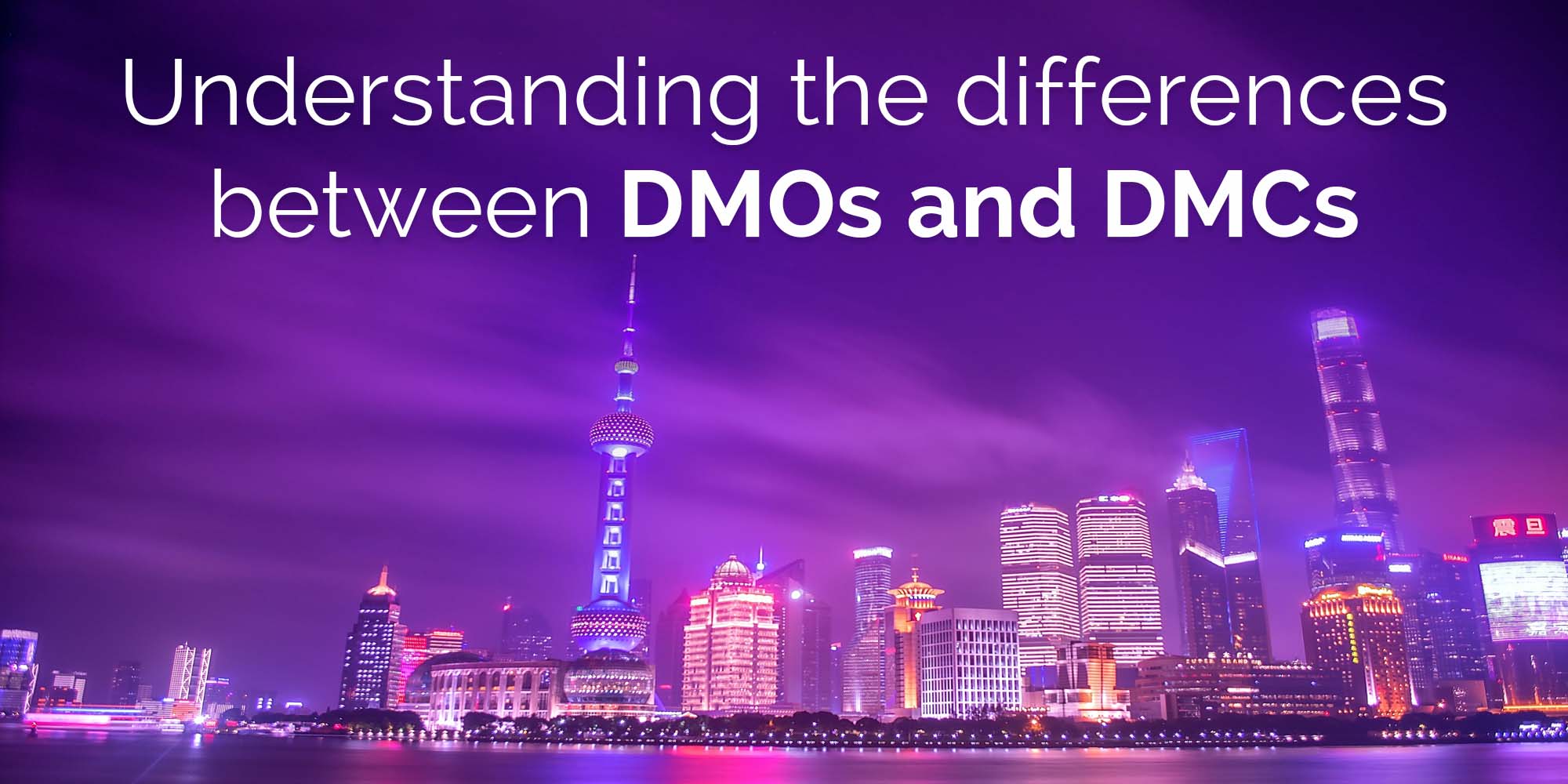
We are definitely not the first to say that tourism is filled with similar sounding and confusing acronyms, but we are happy to put our hands up and help you make sense of a few. Instead of leaving you to feel on the outer circle of an exclusive club, we would like to lift the curtain on key tourism terminology that will undoubtedly make you feel a whole lot more comfortable with your knowledge of the industry.
You would be forgiven for mistaking Destination Management Organisations (DMOs) and Destination Management Companies (DMCs) for being one and the same, but as this blog highlights, each is very distinctive in their own right. Although both share extensive knowledge of a particular destination, the way in which they work, their overall objectives and how they interact with travellers is what earns them their own separate titles.

Before we leap into the definitions of DMOs and DMCs, it i s first important to properly define what a destination is. We know for some it may seem obvious what constitutes a destination but there is a set of crucial characteristics that defines one.
Seen as hubs that drive tourism activity and engagement, destinations are a “physical space in which a visitor spends at least one overnight.” Other specifics regarding destinations include:
- The presence of attractions, tourism support services, tourism and non-tourism related activities
- Management is clearly defined by both physical and administrative boundaries
- A range of stakeholders are involved
Destinations can of course be grouped in different ways. For example, some tourists may see a whole country as the destination, for others it might narrow down to a regional destination or a specific town/city.

The main thing to associate with the definition of Destination Management Organisations (DMOs) is that they have the bigger picture in mind and work towards a common goal. Tasked with coordinating all elements of a tourist destination, from attractions, marketing, accommodation to amenities, DMOs strive to build the competitiveness of the whole destination while keeping sustainability front of mind.
Depending on the governance structure of an area, a DMO may be broadly responsible for a country, often referred to as a National Tourism Organisation (NTO), or they might have a regional focus and receive the title of Regional Tourism Organisation (RTO). Whatever their scope, the efforts of DMOs are underpinned by the desire to spread the benefits of tourism across their community and establish strong brand identity for the destination.
In order to drive the competitiveness and sustainability of their destination, DMOs often create destination management models that guide and shape their decision making. Looking at short, medium and long term prospects, considerations are made towards funding allocations, crisis management responses, marketing efforts, business development, training and sustainability. The beauty of these organisations is that they take a holistic look at the industry and closely consult with various stakeholders before establishing a set direction.
While DMOs essentially oversee the development of tourism in a destination, they are mindful not to control the efforts of independent businesses and are very impartial in their position. Careful not to demand particular actions be taken by tour operators, DMOs take on more of a guiding, facilitating role and want to see local businesses succeed. These organisations offer a huge amount of support to local businesses through the likes of networking, stakeholder engagement, knowledge sharing and training, yet have no say in how their suppliers do business.
When it comes to marketing, DMOs are huge champions for sharing the amazing things that are going on in their destination and offering suggestions on what tourists should see, try, taste and get amongst. Rather than trying to stimulate direct purchase off their platforms, DMOs act as an intermediary for local businesses and try to guide tourists towards the efforts of individual suppliers. DMOs achieve this through ‘above-the-line’ marketing activities such as highly visible campaigns, outdoor media, radio and television.
In the same breath, DMOs often spend time focusing on B2B marketing where they seek the interest of inbound tour operators to bring travellers to the destination. One way to capture the attention of these operators is to invite them on trade familiarisations (famils) where they personally get to enjoy activities and experiences that would be well suited to their clientele. Considered to be ‘below-the-line’ marketing, this kind of promotion establishes close working relationships with highly connected agents who can relay their personal experiences to travellers in the hopes of generating greater visitation to the destination. DMOs need to think strategically about what aspects of their destination they are going to show tour operators, travel agents and trade personnel; with thought going into the appearance, content and aesthetic of their itineraries. They also need to get the all important buy-in from suppliers to provide their services or experiences on a complimentary basis thus requiring their financial investment in the famils.
Serving up platefuls of inspiration, these destination specialists live for the greater good and to build a better future for their local tourism industry.

Comparatively, Destination Management Companies (DMCs) are more focussed on planning and booking trips for travellers, and all of the finer details that this entails. While they want to drive visitation to their local destination, they are largely responsible for the organisation of corporate meetings, incentive trips, conferences and events – also known as MICE (yes, yet another travel acronym for you!).
We all know the saying ‘you can’t be everything for everyone,’ and this is the exact approach that DMCs take with their daily operations. What gives DMCs an added edge over a business or individual corporate traveller booking their trip independently, is that they are widely regarded as experts on the ins and outs of the destination. While those who are needing to organise a meeting or event in their current location may be comfortable with coordinating all of the details, those that are planning trips to another destination can employ the use of a DMC for added confidence and security. Often seen as specialised consultants, DMCs use their expert knowledge of their area’s local customs, language, culture and nuances to craft trips or events that their clients so greatly desire. From considering what operator should meet and greet the travellers upon their arrival and what accommodation provider would best suit their needs, to deciding what dining experiences and activities should be booked, DMCs save their clients hours of time and unnecessary stress.
Essentially acting as a third party, connecting local businesses with potential travellers, the presence of a DMC means that their clients only have to deal with one point of contact rather than multiple different suppliers. Although DMCs are focussed on pairing the right experiences with the right traveller or group of travellers, they do not operate with impartiality in mind like a DMO. For this reason, these companies usually choose to promote and sell the products of suppliers that they have the best relationships or deals with. By leveraging off their preferred partners/suppliers, DMCs are able to capitalise on the preferential rates and negotiated discounts that consortia and substantial buyer power offers – ultimately passing this on to their clients.
Looking through the lens of a local business, the establishment of a partnership or working relationship with a DMC is a valuable avenue for tapping into new client bases. While a DMO tries to stimulate greater demand for the local area, the marketing and expertise of DMCs bring local businesses in direct contact with tourists that are looking to spend money.
Similar to the debate around the relevance of travel agents in the digital world, there have been discussions in recent times about the future of DMCs. It may be true that people are able to more confidently research and book trips on their accord with the help of the internet, but the due diligence, creative ideas, risk management, up to date information and quality assurance that DMCs offer is invaluable. Aiming to take the stress away from travel planning, DMCs create highly personalised, bespoke itineraries and packages .
UNWTO World Tourism Organisation Destination Marketing Organisations destinations UNLIMITED Tourism Tiger Incentive Research Foundation
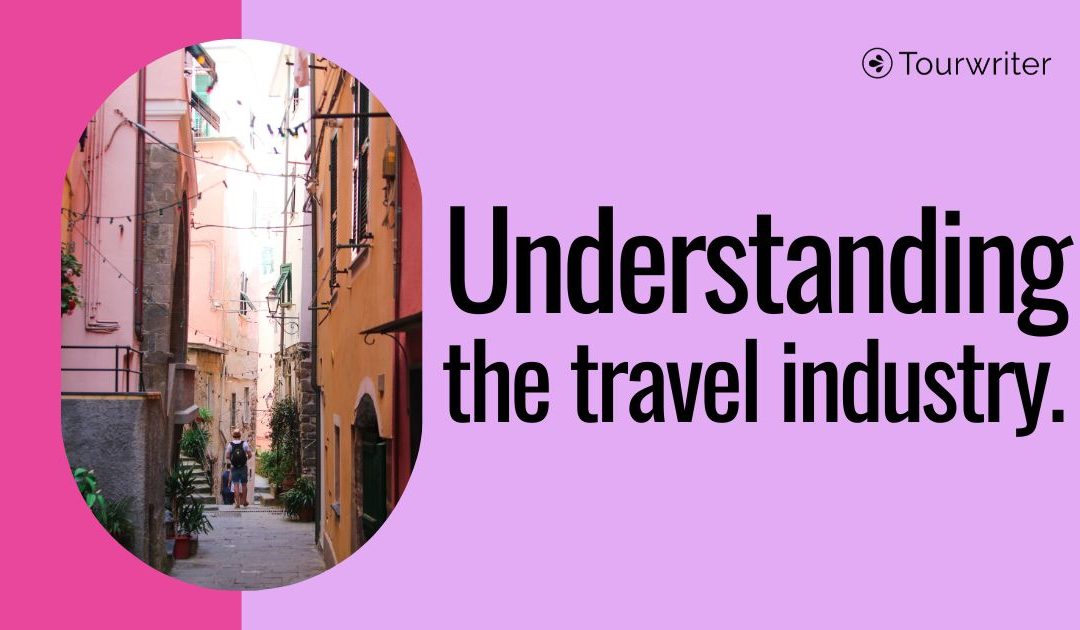
How does the travel industry actually work?
Who are the key players in the industry, where do they all fit together and how does the industry actually work?! There’s no doubt that the travel industry is a confusing space to wrap your head around so we’ve broken it down for you in this easy new resource.
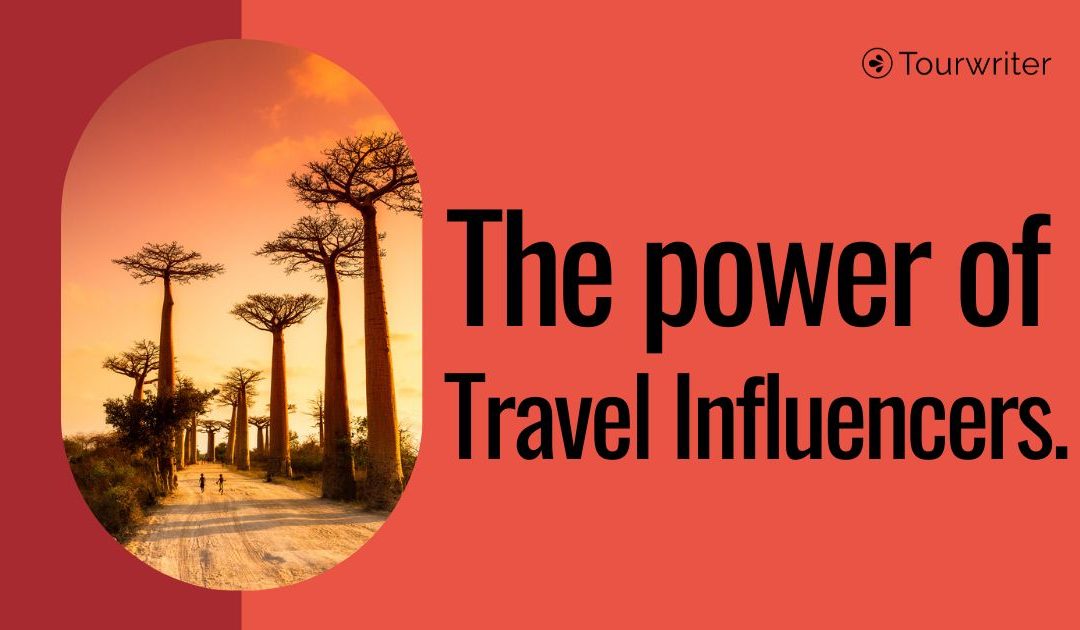
Travel designers- meet the influencers you should work with.
Understand the role travel influencers play in the industry and why tour operators should be following, interacting and collaborating with them. Explore eight global travel influencers who are inspiring travellers daily.
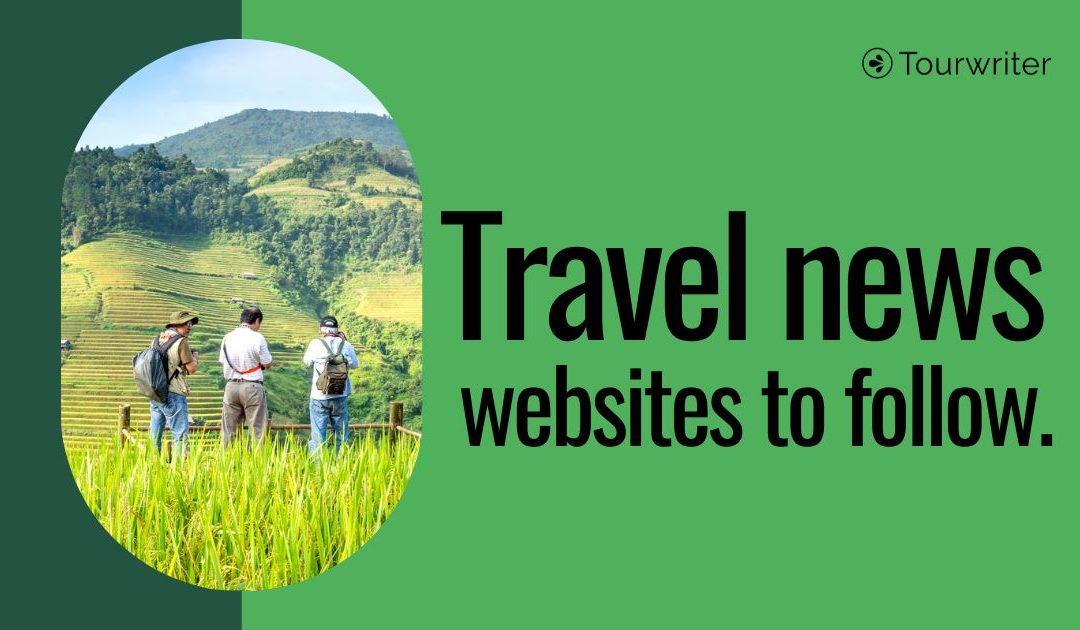
Tourism news websites you can trust
In the tourism industry it can be hard to differentiate the reliable travel news sources from the not-so-trustworthy ones. In this blog we summarise the top travel news websites that tour operators, travel agencies and DMC’s should pay attention to.

How to set your team up for success when introducing new software
Making changes happen is hard. Especially when it is something that will create a significant impact on the way you work, like new software. We discover what change management is and how it can assist you, your leaders and your team in creating new processes that will make you more successful in the long run. Is it time for a change?
UN Tourism | Bringing the world closer
Competitiveness.
- Market Intelligence
Policy and Destination Management
- Product Development
share this content
- Share this article on facebook
- Share this article on twitter
- Share this article on linkedin
UN Tourism works to provide guidance and share good practices on policies and governance models aimed to effectively support the tourism sector at the different levels: national, regional and local.
The development and management of tourism destinations requires a holistic approach to policy and governance.
Governance has two specific dimensions:
- Directive capacity of government , determined by coordination and collaboration as well as by the participation of networks of stakeholders.
- Directive effectiveness, determined by institutional skills and resources that support the ways in which processes are conducted to define goals and search for solutions and opportunities for relevant stakeholders, and by the provision of tools and means for their joint execution.
In this sense, UN Tourism works to support its Members in their efforts to develop efficient governance models / structures and policies, focusing among others on:
- Tourism policy and strategic planning
- Governance and vertical cooperation, i.e. national-regional-local levels
- Public Private Partnership (PPP)
Destination Management
Destination management consists of the coordinated management of all the elements that make up a tourism destination. Destination management takes a strategic approach to link-up these sometimes very separate elements for the better management of the destination. Joined up management can help to avoid overlapping functions and duplication of effort with regards to promotion, visitor services, training, business support and identify any management gaps that are not being addressed.
Destination management calls for a coalition of many organizations and interests working towards a common goal, ultimately being the assurance of the competitiveness and sustainability of the tourism destination. The Destination Management Organization’s (DMO) role should be to lead and coordinate activities under a coherent strategy in pursuit of this common goal.
Though DMOs have typically undertaken marketing activities, their remit is becoming far broader, to become a strategic leader in destination development. This is a vital ingredient for success in every tourism destination and many destinations now have DMOs to lead the way.
From a traditionally marketing and promotion focus the trend is to become leading organizations with a broader mandate which includes strategic planning, coordination and management of activities within an adequate governance structure with the integration of different stakeholders operating in the destination under a common goal. Destinations wherein such an organization is not still in place are increasingly creating or plan to create a DMO as the organizational entity to lead the way.
UN Tourism has identified three areas of key performance in destination management at DMO level: Strategic Leadership, Effective Implementation and Efficient Governance.
UN Tourism supports its Members and Destination Management/Marketing Organizations through the UN Tourism.QUEST - a DMO Certification System. UN Tourism.QUEST promotes quality and excellence in DMOs planning, management and governance of tourism, by means of capacity building. UN Tourism.QUEST Certification evaluates the three areas of key performance in destination management at DMO level: Strategic Leadership, Effective Implementation and Efficient Governance. With a training and capacity building component, UN Tourism.QUEST is a strategic tool which allows the DMOs to implement an improvement plan to achieve the criteria and standards of the Certification with the aim of enhancing their management processes and thus contribute to the competitiveness and sustainability of the destinations they represent.
Events & Publications
- International Seminar on Destination Management
- 2nd Conference on Destination Management in the Mediterranean
- 6th International Conference on Destination Management
UN Tourism Guidelines for Institutional Strengthening of Destination Management Organizations (DMOs) – Preparing DMOs for new challenges
Many factors account for the increased focus on effective destination management, all of them urging destination management organizations (DMOs) to face and adapt to new challenges. From traditional marketing and promotion boards the trend is for these entities to increasingly enlarge their scope to become all embracing DMOs, aiming to enhance the competitiveness and sustainability of destinations within a harmonious relationship between the residents and visitors.
Competitiveness Committee (CTC)
The Committee on Tourism and Competitiveness (CTC) is one of the technical committees of the UN Tourism and it is a subsidiary organ of the Executive Council . The Committee was established at the 95th session of the Executive Council in Belgrade, Serbia in May 2013 (CE/DEC/7(XCV). Its Rules of Procedure and the composition were approved by the Executive Council at its 96th session (Victoria Falls, Zimbabwe, August 2013) (CE/DEC/9(XCVI).
Since its establishment in 2013, CTC focused its work mainly on assessing the state of knowledge on the basic concept of “ tourism competitiveness ” and identifying its key factors . This process has also included identifying, developing and harmonizing concepts, models and operational definitions used in the tourism value chain .
Work priorities
(a) To support the Organization in fulfilling its normative role;
(b) To provide a dialogue mechanism between the public and private tourism stakeholders and academia to give guide in building and strengthening tourism competitiveness policies and strategies; and
(c) To build synergies and strategic alignments in the harmonization of the related activities of the Secretariat as well as other collaborating organizations/entities in order to ensure consistency and consensus in the delivery of the outputs and reinforce the official position of the Organization.
Provide UNWTO Members and other tourism stakeholders with a comprehensive and concise, operational, applicable and globally relevant conceptual framework to set the scene and contribute to establish a common ground for a clear harmonized understanding of:
i) concepts, models and operational definitions used in the tourism value chain;
ii) the quantitative and qualitative factors that explain competitiveness at the destination level which may be translated into technical guidelines facilitating a methodology for destinations to identify and evaluate their own factors of competitiveness.
As an outcome of the work of the CTC, the 22 nd Session of the General Assembly held in Chengdu, China (11-16 September 2017) adopted as Recommendations key definitions. Along with these definitions the Committee also focused on identifying the key quantitative and qualitative factors for “tourism competitiveness ” under two categories: i) governance, management and market dynamics, and ii) destination appeal, attractors, products and supply.
Full list of definitions adopted by the 22 nd Session of the General Assembly held in Chengdu, China (11-16 September 2017)
As part of the work of the UNWTO Committee on Tourism and Competitiveness (CTC) in its mandate for the period 2015-2019 prepared a paper on " Tourism Policy and Strategic Planning " which delves into this factor for tourism competitiveness. This paper (available below in pdf) aims to:
- Provide UNWTO Members with a comprehensive understanding on national tourism policies and contribute to their successful formulation and implementation;
- Explore key areas which need to be addressed in tourism policy and strategic planning in order to ensure the competitiveness and sustainable development of tourism;
- Assess the key areas addressed by UNWTO Members in their tourism policies and provide case studies to illustrate key elements of a sound tourism policy; and
- Serve as a practical tool for UNWTO Members and tourism policymakers by including a set of recommendations.
Composition of the CTC (2019-2023)
Full Members
Bahamas Bahrain Brazil Fiji (Vice-chair) India Israel Kenya Republic of Moldova Senegal (Chair)
Representative of the Associate Members Macao, China (2019-2021) Puerto Rico (2021-2023)
Representative of the Affiliate Members FITUR, Spain (2019-2021) Asociación Empresarial hotelera de Madrid (AEHM), Spain (2021-2023)
Meetings of the CTC:
1st Meeting: 25 August, 2013, Victoria Falls, Zambia /Zimbabwe (during 20th UN Tourism General Assembly) 1st Virtual Meeting: 27 March, 2014 2nd Virtual Meeting: 3 July, 2014 3rd Virtual Meeting: 22 October, 2014 2nd Meeting: 28 January, 2015, Madrid, Spain 3rd Meeting: 13 September, 2015, Medellin, Colombia (during 21st UN Tourism General Assembly) 4th Meeting: 22 January, 2016, Madrid, Spain 4th Virtual Meeting: 21 April, 2016 5th Meeting: 20 January, 2017, Madrid, Spain 5th Virtual Meeting: 2 March, 2017 6th Meeting: 11 September, 2017, Chengdu, China (during 22nd UN Tourism General Assembly) 7th Meeting: 19 January, 2018, Madrid, Spain 8th Meeting: 10 September 2019, Saint Petersburg, Russian Federation (during 23rd UN Tourism General Assembly) 9th Meeting: 24 January, 2020, Madrid, Spain 10th Virtual Meeting: 30 July 2020 11th CTC Meeting: 30 November 2021, Madrid, Spain (during the 24th UN Tourism General Assembly) 12th Virtual Meeting: 12 September, 2022
11th CTC Meeting: 30 November 2021, Madrid, Spain
During the 24th un tourism general assembly.

Download PDF
- Position Paper on Tourism Policyand Strategic Planning
- UN Tourism Tourism Definitions
- Composition of the Committee on tourism and competitiveness
See how Cvent can solve your biggest event challenges. Watch a 30-minute demo.

DMOs vs DMCs vs CVBs: A Comparison Guide

If you're planning a meeting or event in a new location, still searching for the right location for your event, or want to dig deeper into a location’s offerings, you might consider partnering with a DMO, CVB, or DMC. These organizations can help you understand and navigate a destination, recommend local event venues and service providers, and show you everything a location has to offer.
The tourism industry uses three terms for these types of organizations, and while they might run in similar circles, there are important differences between them.
So, what is a DMO vs DMC vs CVB? What do these acronyms mean, and how do they differ from each other? In this blog post, we'll explain the roles and functions of each to help you understand how planners can uplevel their events with the help of these types of organizations.
What Is the Difference Between a DMO, DMC, and CVB?
To start breaking down the differences between DMOs, DMCs, and CVBs, let’s discuss what they each do .
What Does a DMO Do?

A DMO (Destination Marketing Organization) is responsible for promoting a destination to potential visitors and creating a positive image of their location. A DMO is a non-profit organization that works with various stakeholders, such as local businesses, government agencies, and media to help boost tourism and create the best experiences for those who visit and host events.
For planners, this means DMOs are a key to the city! DMOs can provide local expertise to help planners identify and connect with:
- Hotels and accommodations
- Event venues
- Attractions
- Food and beverage operations
- Suppliers and vendors
- Local event sponsors
- Media connections
- Public and private transportation options
- Local regulations and best practices
Once they know what you’re looking for, organizations like these can offer custom recommendations for event programs, such as themed events, local excursions, entertainment, and more based on a planner’s budget, group size, goals, etc. DMOs can even help negotiate contracts, obtain permits, access incentives, and secure publicity.
What Does a CVB Do?
A CVB (Convention and Visitors Bureau) is essentially synonymous with DMOs. CVBs have the same stakeholders, priorities, and functions as DMOs and, in fact, many CVBs have rebranded themselves as DMOs, and the terms are often used interchangeably.
Why use the term DMO vs CVB? Long story short:
- Not every location includes a convention center, so it wouldn’t be accurate to call a tourism organization at those destinations a “ convention and visitors” bureau (CVB).
- DMO is a more globally recognized term compared to CVB, which makes DMO preferable.
- The use of the word “bureau” in CVB tends to suggest bureaucratic systems, which isn’t what you want to think of when talking about tourism!
What Does a DMC Do?
A DMC (Destination Management Company) provides paid services and logistical support to visitors and event planners, helping to coordinate transportation, accommodation, activities and tours, and events. A DMC is usually a for-profit company that serves clients while promoting their partners, including travel agencies, corporations, associations, and others.
While DMOs primarily assist in showing planners all their locale has to offer, DMCs are often more involved in helping planners manage all destination-related elements of their events. So, DMCs can offer you many of the same services a DMO can, but (for a price), they’ll also execute some elements of your event.
Here’s a quick guide to help you understand the differences between these organizations:
In this post, we’re going to focus on what it looks like to work with DMOs (or CVBs) , but you can learn more about DMCs here .
What Are the Benefits of a DMO for Event Planners?

Working with a DMO can benefit event planners in many ways. Particularly when planners are unfamiliar with a location or are having trouble choosing the perfect destination for their event, a DMO can help pave the way.
Here are some of the ways DMOs can help event planners:
1. Working with a DMO Is Free!
One of the biggest benefits of working with a DMO as a planner is that it doesn’t cost a cent! With cost savings top of mind for many organizations, this is one area where you don’t have to worry about pinching pennies or breaking the bank.
2. Local Connections and Expertise
A DMO can facilitate connections and lasting partnerships with local stakeholders, such as businesses, government agencies, and media. These connections are so useful , especially if planners have a limited local network of their own.
A DMO can also leverage its network and influence to advocate for planners’ interests, resolve any issues or challenges that may arise, and leverage its marketing and promotion channels to give events a boost.
3. Enhanced Attendee Experiences
A DMO can enhance your attendees’ experience by providing added value and support services, such as welcome bags with maps, guides and brochures, and coupons for local businesses, or VIP amenity baskets with local products.
A DMO can also assist with creating and implementing programs and activities that showcase the unique culture, history, and identity of the destination, such as tours, festivals, and other events happening in tandem with planners’ events.
4. Environmental, Social, and Corporate Governance (ESG) Considerations
While choosing an event destination and executing their events, planners must consider ESG factors like sustainability; diversity, equity, and inclusion (DE&I); accessibility; and corporate governance compliance. A DMO can help identify the best partners based on shared priorities and alignment with corporate policies.
For example, DMOs can help planners implement sustainable practices that benefit the destination, the environment, and the community, by partnering with businesses and venues that aim to reduce waste, energy, and water consumption, use local and organic products, and offset carbon emissions.
DMOs can also help identify voluntourism opportunities, whether as a team building exercise or as an added activity for event attendees to participate in during their free time.
Moreover, planners looking for an event venue that prioritizes accessibility and diversity can get help from a DMO to find viable options with the right resources, infrastructure, and inclusive practices.
5. Innovative Offerings
A DMO can foster creativity and innovation by introducing planners to new products, services, and venues that enhance the quality and diversity of local offerings. The more unique experiences a planner can offer attendees, the better!
Not only does this help planners deliver memorable and engaging experiences, but it also helps differentiate the destination from similar events or previous iterations of an event.
6. Resources to Learn About Your Destination
The more information planners can get about their destination, the better. So, what’s better than having all the details you need handed to you in a curated package?
DMOs have marketing materials for their destination, including professional photos and videos of events and locations, destination brochures and visitor guides, reviews of local businesses, blogs, testimonials, maps, speaker resources, and more.
Not only are these great resources for you and your attendees, but they’re also useful for pitching the location to stakeholders to demonstrate why your destination of choice is the best location for your event!
7. Assistance Planning Itineraries, Transportation, and Logistics
Need help planning an itinerary for a team building event or conference? Want quick and easy details about local transportation options, including parking, buses, shuttles, and more? A DMO can provide you with all these details and help make the logistics portion of your event a breeze.
8. Publicity for Your Events
Who doesn’t love a bit of free publicity? When working with a DMO, they want your event to succeed as much as they want their local businesses to thrive. By plugging your event on their social media and marketing channels, they’re giving your event promotion a boost!
How DMOs Help Hotels, Venues, and Local Businesses
While DMOs can do so much for event planners directly, their involvement with local venues, hotels, and service providers can also be a game changer – not just for these businesses but for planners, too!
Here are a few ways DMOs can help local businesses and, by extension, event planners:
1. Greater Visibility and Simpler Sourcing
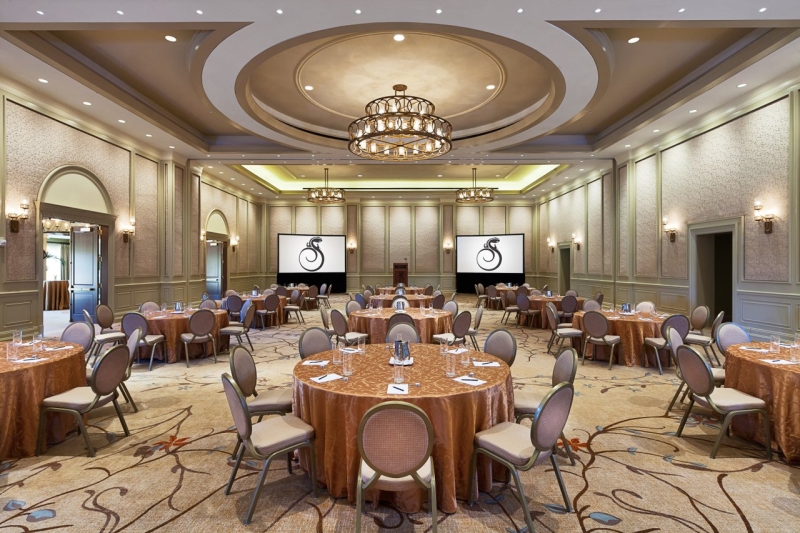
At the end of the day, a DMO wants their local community to thrive, and that means boosting business as much as possible. DMOs can increase the visibility and exposure of hotels, venues, and other local businesses by featuring them on their websites, social media channels, and campaign content, and by circulating positive testimonials and referrals within their network of media outlets, travel agents, associations, and other stakeholders.
Of course, a DMO’s recommendations are only as good as the businesses they’re promoting. That means when an event planner comes to a DMO for help sourcing event venues and partners, they aren’t going to refer just anyone; they’ll find the best of the best and make sure those businesses are front and center for planners to choose from and (hopefully) come back to for future events.
2. Increased Collaboration and Communication
A DMO can foster collaboration and cooperation among hotels and venues, by creating and managing platforms and forums to exchange information, ideas, and best practices. A DMO can foster collaboration and cooperation among hotels and venues, helping to align the efforts and interests of local businesses by providing guidance, leadership, and advocacy.
For planners, this means a more connected network of venues and vendors who are comfortable working with each other and can offer certain benefits for working within their preferred network of professionals.
3. Improved Offerings and Experiences
DMOs have their ears to the ground, both in the world of planners and hospitality professionals, making them excellent partners to help local businesses improve their offerings. With access to market intelligence, trends, and reviews of local services, DMOs can help hotels, venues, and service providers improve their performance based on post-event feedback.
This is great for local businesses and planners alike, as planners and event attendees benefit from the improvements DMOs help facilitate!
4. Innovative Achievements
A DMO can foster innovation and creativity among local hotels and venues by encouraging them to adopt new technologies, practices, and solutions that enhance their efficiency, productivity, sustainability, and overall offerings.
DMOs can also showcase the innovative achievements of hotels and venues by featuring them in their awards, publications, and events. The more publicity these innovations receive, the easier it is for planners to find interesting experiences to offer their attendees!
5. An Advocate for All
DMOs have the power to advocate for and represent the interests and needs of planners, attendees, local businesses, and residents. They act as a bridge between all these stakeholders, promoting a common vision and ensuring everyone is satisfied with the events at their destination.
That means that in addition to helping their local hotels, venues, and service providers attract business, they operate as advocates to help planners achieve the best experience for their attendees while considering the needs of residents, who may be affected by events happening near their homes.
By working in partnership with all these stakeholders, DMOs play an integral role in establishing long-term relationships and partnerships within the travel and tourism industry at their destination.
When Should You Work with a DMO?

If you’re on the fence about working with a DMO to help plan and coordinate your events, ask yourself these questions:
- Do I know my event location well enough to find the best venues, experiences, and local recommendations for my attendees?
- Should I try to build lasting partnerships with local venues and businesses so my future events in this location run more smoothly?
- Do I need help ensuring my event is well-received, not only by attendees but also by local businesses and residents?
- Am I interested in more unique, “outside the box” experiences for attendees?
- Do I have niche needs or specific requirements that set my event apart?
- Do I want FREE assistance connecting with local businesses, services, and offerings?
If you answered “yes” to any of these questions, a DMO is a great place to start!
With so many benefits of working with DMOs and absolutely no cost to event planners, there’s really no reason to go it alone. Whether you’re planning events in a familiar location or just exploring a new destination, DMOs have something to offer every planner in any situation.
This blog is written in partnership with Visit Loudoun .

Hope Salvatori
Hope is a Senior Content Marketing Associate who has been with Cvent for more than two years. She has 8 years of experience producing content for corporations, small businesses, associations, nonprofits, and universities. As a content professional, she has created content for a wide range of industries, including meetings and events, government and defense, education, health, and more.
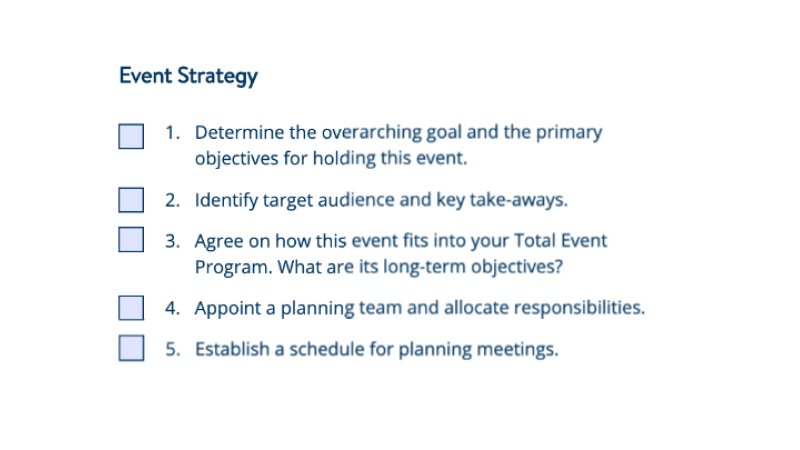
More Reading
How to become an event organizer: your roadmap to success, how to start an event planning business: the ultimate guide, how to run a meeting that gets real results: the ultimate guide.
Subscribe to our newsletter
Sign in, Save Money
Sign in to save 10% or more with a free DMC membership
- Individual Bookings
- Hosted Buyer Programmes
- Upcoming Events
- Daily Blogs
The Difference Between DMC and DMO – Unveiling the Varied Roles and Functions
- 4 mins read

DMCs vs. DMOs: Unveiling the Distinctive Roles in Travel Management and Promotion
The pivotal role of dmcs (destination management companies), key characteristics of dmcs:, exploring dmos (destination marketing organizations), key characteristics of dmos:, why both dmcs and dmos matter, in conclusion: maximizing travel with dmcs and dmos, popular posted, unlocking success with destination management company: a deep dive into their vital role.
- 4 min. to read
What Are The Different Types Of DMOS
- 12 min. to read
What is a Destination Management Company (DMC)?
- 5 min. to read
What Benefits Does a DMO Provide
- 13 min. to read

Unlocking Business Success: The Multifaceted Benefits of B2B Travel Agencies
- 9 min. to read
Sponsor By DMC
Search premium Corporate DMC´s Incentive DMC´s, Event DMC´s, Travel DMC´s.

Experience Qatar Destination Management Company - Qatar
- Tour Operators
Destination Management Company - Dubai
This adventure tour is one of the most comprehensive evening desert safaris available in Dubai to discover the region´s untouched desert wilderness. Besides the exhilarating ever 4X4 dune bash.
Newsletter Signup
With over 6,000 destination suppliers we are sure we will be able to connect you with the perfect supplier that matches your needs.
- Trending Destinations
- Africa 65 partners
- Qatar 7 partners
- Brazil 38 partners
- Canary Islands 07 partners
- Dubai 09 partners
- Egypt 49 partners
- India 484 partners
- Indonesia 35 partners
- Italy 179 partners
- Kenya 72 partners
- Latin America 39 partners
- London 19 partners
- Maldives 26 partners
- Morocco 68 partners
- Nepal 157 partners
- North America 05 partners
- South America 28 partners
- Spain 305 partners
- UK 118 partners
- UAE 12 partners
- Bora Bora 59 properties
- Phuket Province 5,500 properties
- >Bora Bora 59 properties
Be Found, Be Connected, Be Discovered! Your Gateway to a World of Opportunities for Destination DMCs and Travel Services
- United Kingdom
- [email protected]
- + 44(0)781 56 92694
- How we work
- Privacy Policy
- Terms and Conditions
Please fill the required fields*
Recover Password
Lost your password? Please enter your email address. You will receive a link to create a new password via email.
Get New Password
Don't have an account? Sign Up
Already have an account? Please login Here
- Why We’re Different
- Join Our Team
- Strategic Alliances
- Why Tourism
- Strategic Planning
- Tourism Development
- Workforce Development
- Destination Management
- Destination Marketing
- Solimar DMMS
- Creative Portfolio
- Testimonials
- Tourism for Development Blog
- Case Studies
- Useful links

Why DMOs must be about Management, not just Marketing
Written by Veronic Santapa on October 11, 2022 . Posted in Blog .
DMOs are crucial organizations within the tourism industry. They were primarily established to promote destinations. However, with the rapid growth of tourism, the need for its sustainability and management of the sector eventually emerged. Therefore, whether DMOs should focus only on marketing or broaden their activities and be a management organization is part of the future agenda. At Solimar, we have seen time and time again why the M in DMO must also be about destination management, and not just destination marketing.
Let’s define what a DMO is, what roles they fulfill within a destination, and find out why these roles are mostly related to the management of the destination:
What is a DMO?
DMO stands for Destination Marketing/Management Organization. At times, the role of a DMO is mistakenly perceived to be limited to the marketing efforts, but in reality, DMOs contribute majorly to the development aspects of a destination too. Effectively, the UNWTO defines it as “the leading organizational entity which may encompass the various authorities, stakeholders, and professionals and facilitates partnerships towards a collective destination vision”. Thus, DMOs are not only about marketing, but also about management. But what do DMOs manage exactly?

Why are DMOs important?
Originally DMOs were established to competitively market the destinations by image-making, brandin g, and advertising what a place has to offer to tourists. However, in order for a destination to be successful, applying good marketing strategies or setting up an outstanding promotional campaign is no longer enough. Strategic management of the destination is also extremely important. Thus, it is clear that for the future of more sustainable tourism, DMOs must take the lead, as they hold the skills and the knowledge to support the destination through the management of tourism activities. Additionally, they have the ability and the tools to monitor the destination’s performance, allowing them to create the most suitable and sustainable approach to destination development.
To effectively manage a destination, DMOs should:
- Manage the variety of different stakeholders involved in tourism. This is also connected to the creation of a common website platform, where stakeholders can engage and contribute to the destination’s development
- Consult visitor-related sectors, namely, accommodation, food and other services related to tourism. To this regard, DMOs also facilitate the introduction of quality standards in service
- Help communities become more visible. Developed and advanced communities raise the sense of pride among their residents
- Support local economies
- Encourage sustainable development of tourism
As shown, apart from marketing and brand image creation, DMOs can truly contribute to developing sustainable destinations.

What is destination management?
DMOs are vital for touristic destinations, especially where national or local governments struggle to manage and control all the activities related to tourism. DMOs are especially crucial in the destinations with emerging economies and the tourism sector. The roles of DMOs involve destination development , management of all the available assets and monitoring of the tourism impacts at the destination. DMOs’ ultimate goal is to maintain the destination successful, competitive, and socially and economically developed, and in order to achieve that, it is necessary to create and implement the destination’s development plan.
Destination Development
DMOs’ main role is destination development. Destination development includes a range of different activities, such as marketing efforts, improvement or diversification of tourism products and quality of the services supplied. For DMOs, it is crucial to create a development plan which will lead all the activities in the short or long-term perspective. With the development plan, DMOs set the target goals and indicators for businesses, communication, marketing and product development. All the actions taken by the local stakeholders and the DMO itself should be in line with the destination development plan.
Much of Solimar’s work is oriented on destination development, as many destinations and, consequently, DMOs need facilitation and support at their early stage.

Management and coordination of destination assets
Every destination comprises a variety of resources provided by different organizations, and these resources need to be coordinated accurately to develop a competitive and sustainable tourism offer. The development and maintenance of a tourism destination is a complex process, and it requires a strategy capable of generating and sustaining synergy among all the various elements involved in the sector.
Local stakeholders, entrepreneurs, government, citizens and visitors have their own roles at the destination, and they are all part of the development process. It is the DMO’s prerogative to bring together representatives from each group to establish integrated and regular interactions and collaborations. These collaborations are essential to create the tourism product, the destination strategy, policy and crisis management plans to foster investments and funding and to evaluate the overall destination’s performance. Moreover, DMOs are also expected to provide services related to the improvement of physical and human resources, supply assistance and advice for hospitality and tourism businesses.
Solimar International’s examples of DMO and asset management
Solimar recognizes the value and importance of DMOs – collaborating with them is a key part of many of our projects. But most importantly, we strategically assist destinations where such institutions are inexistent, but are essential for a sustainable tourism development.
For example, in our current project USAID Visit Tunisia, we are supporting the country in differentiating its tourism offer by promoting six lesser known regions in the country. In most cases, tourism in Tunisia is solely managed by the national tourism organization. The lack of regional DMOs compromises these emerging destinations’ possibility to create and implement a tourism strategy and development plan adequate enough to support the emerging destination and its success.
For this reason, Solimar is assisting these destinations by encouraging and facilitating the dialogue between the public and private sector and the local communities at a regional level. Under the guidance of our expert Solimar team, the local stakeholders are collaborating and drafting destination development plans, which they are also using to advocate for a local DMO to be established with the help of the national tourism organization. Through this project, we are also supporting Destination Dahar , the first DMO in the country.

Why DMOs must monitor tourism impacts
As the tourism market and destinations change and evolve, they create an immediate urge of monitoring the impacts created by the tourism activities. This is crucial to evaluate and manage the change and respond to the challenges.
The main goals of monitoring are:
- To understand the effects of tourism
- To identify improvements or/and challenges. This will help the future planning and response
- To enable destinations to remain competitive
Another aim of monitoring is to find out how strategic goals of the destinations are met and measure the main indicators of the destination development. Monitoring impacts helps DMOs collect data on tourism activities. This facilitates the process of analyzing the tourism impacts and coming up with an adequate response, in particular to the most challenging ones. This way DMOs stay responsible, accountable, and fulfill their strategic goals.

DMOs track positive and negative impacts of tourism
Monitoring tourism impacts covers the following main areas: economic, social and environmental. Tourism impacts can be seen as negative and positive. Growing number of visitors positively contributes to the economic growth within the destination. However, it can also cause some threats to the cultural and natural assets of the destination if not managed and controlled properly. For example, in the case of cultural heritage, not well-managed visitor flows can cause damage to the sites.Or in the case of nature, tourism can cause major environmental challenges.
As seen above, monitoring helps DMOs to evaluate tourism impacts and take the appropriate measures. Various projects implemented by Solimar across the globe cover supporting development of DMOs and naturally, this involves facilitating them to acquire different roles, including monitoring the tourism impacts and effectively responding to it. Solimar’s ongoing project Bangladesh Ecotourism and Conservation Alliance envisages supporting one of the most important protected areas – the Sundarbans. With the project, Solimar works to implement a series of interventions in order to improve tourism and natural resources management in the area. One of the outcomes is creating a local DMO, which will unite the private and public sector and contribute to the conservation of the protected areas through sustainable governance.

So, why must DMOs make this shift?
Dmos facilitate the social and economic development of the destinations. this is especially important in the case of societies where tourism and the economy are in their emerging phase. in this process, fulfilling merely a marketing goal is not enough. through proper management and leadership, dmos can create inspiring and attractive destinations that will contribute to their socio-economic growth. , interested in discovering how solimar can support the management of your destination find more information about our services and training courses . and don’t forget to check out more solimar blog posts to learn everything about the importance of dmos: here and here ..
Blog by Veronica Santapa and Teona Zhuzhunadze
Tags: destination development , destination impacts , Destination Management Organization , Destination Marketing , Destination Marketing Organization , digital destination marketing , dmos , sustainable tourism , tourism management , tourism marketing

How DMOs Can Work Better with Local Tourism Partners

That’s because there are a variety of DMO funding models that determine who and what an organization devotes attention to. A Destinations International DestinationNEXT 2019 survey found that about one-third of respondents (32%) were part of a non-profit with a membership model, the largest percentage of respondents.

Source: Destinations International
Nearly 22% said they had a non-profit with no membership model, while 20% were government organizations, and 9.4% had a public/private partnership.
DMOs with membership models typically focus their efforts on marketing their members, which often include tour operators, attractions, and hotels, and some funding models largely depend on the latter for tax dollars.
A Mutually Beneficial Relationship
With both travelers’ expectations and tourism arrivals increasing, it’s never been more important for DMOs and their partners to understand how to maximize their symbiotic relationship.
This relationship hinges on both DMOs and partners’ abilities to listen to each other. DMOs need to ensure that partners understand what they do and the connection between their strategies, economic impact, and partners’ business success. They also need to listen to their operators, members and other partners of all sizes to understand the challenges they face.
“The worst thing a DMO can say to an operator is ‘let me know if you need anything,’ because they don’t necessarily know what they need. Operators know that consumer behavior and marketing is changing fast,” writes William Bakker, Chief Strategist & Partner at Destination Think! .
Bakker said business owners often don’t know where to start or how to be 100% effective.
“You need to be there for them. Many DMOs conduct training sessions for their operators. They need to do more. Your operator’s marketing is a DMO’s marketing, and in an interconnected world, you need operators to maximize their efforts.”
Here are a few examples of how DMOs can sell their destination while also helping travel and tourism partners with their specific and more long term marketing plans.
1 | Create Shareworthy Content On Your Blog
Travelers love listicles and sample itineraries that are easily digestible and shareable. Some DMO blogs are widely used by locals and tourists alike and have a steady stream of organic traffic, while other tourism boards help bolster their content’s organic reach with paid media.
Visit Indy thought like travelers when it came up with the idea to write a blog post on Instagrammable foods in Indianapolis . Many travelers love to share photos of the food they eat during their trips to 1) help them remember what they ate and 2) capture moments around a dining table that everyone can relate to.
The post is a beautiful example of using multiple user-generated content (UGC) galleries to showcase delicious and photogenic Indy restaurants. Restaurant partners get some DMO spotlight treatment that comes across in an authentic way, and destination marketers have more content that highlights the unique food culture of their destinations.
Visit Huntington Beach also capitalized on travelers’ penchant for food photos when it published a blog post on local pizza place gems in the destination. After doing some keyword research, the DMO noticed there was a lot of search intent for the best local pizza joint. The result? The blog became one of their top-performing in just a few weeks.
2 | Drive Traffic to Partner Pages with CTAs
Smaller partners may not have websites or a social media presence of their own which can make DMOs’ roles even more crucial.
Yarmouth and Acadian Shores Tourism has already created 76 UGC galleries for each food and beverage partner on their website and plans to add more to help drive traffic to partners who don’t have their own social platforms.

3 | Engage In A Content Partnership
Strength in numbers is a strategy that rarely fails any organization. That’s why it’s key for the travel industry and tourism boards to form both local and regional content partnerships to amplify the stories of attractions, museums, tour operators, and hospitality partners.

Destination British Columbia took this to heart when it started using CrowdRiff’s new Travel Stories . Some 29 Destination BC partners currently participate in the network, which eliminates the need for brands to manually connect with partners to source local stories.
Since the Travel Stories pilot launched this summer, participants in the BC Localhood across the province have created over 800 stories, resulting in over 1.4 million impressions and 145,000 story views.
Even if you’re a smaller DMO or convention and visitors bureau (CVB) without access to a partner network, you can engage in content partnerships on a smaller scale .
4 | Balance Preservation with Growth
There’s a delicate balance between environmental, social, and economic development in any destination and Bhutan is a great example of how to work towards striking one and practicing destination management .
View this post on Instagram Caught in action of a family walking back home after receiving blessing from Buddha Dordenma, the biggest bronze Buddha statue at Thimphu, Bhutan ❣ Always Love your family. Spend time, be kind and serve one another. . . . . #Thimphu #buddha #dordenma #bhutantourism #buddhism #lonelyplanet #buddhist #bhutan #bhutan_ig #bhutantravel #travel #tourism #asia #bhutanese #family #life #asian #himalayas #inside_bhutan_ A post shared by Land of Happiness (@inside_bhutan_) on Jan 7, 2020 at 4:50am PST
Bhutan requires travelers to spend a minimum amount per day, from $250 to almost $2000 for luxury travelers. Visitors must sign up with a registered Bhutanese tour agency before their arrival and there are also controls in place to only allow a certain amount of people into the country each day.
The government uses a portion of generated funds for social welfare programs throughout the country. Local tour operators and other Tourism Council of Bhutan partners benefit from travelers being required to use them and locals are generally happier with tourism because of its tight controls and the positive impact it has on their lives.
This is just one great example of a destination marketing organization taking progressive strides to better manage their destination so everyone wins.
Sign of The Times
If the statistic that more than half of 18 to 65-year-olds book trips purely based on images they see on Instagram, reports the Telegraph , isn’t telling of the age in which destination marketers find themselves, little else is.
DMOs ultimately aren’t responsible for partners’ sales and success, but they are in the business of telling stories that stand out to travelers and inspire them to book a trip, and that’s done best only when everyone is communicating effectively and unafraid to take risks and try new things.

Related content

DMOs & Travel Marketers: How To Get Followers On Instagram

Tourism Marketing: Tools & Strategies That Will Set You Apart

The Destination Marketer’s Guide To Influencer Marketing in 2024

5 Destination Marketing Strategies & Ideas To Promote Tourism

TikTok is Banned in over 30 US states: Here’s What That Means for Tourism Marketing

How to Create a Travel Video That Gets Noticed in 2024

What Type Of Travel Content Speaks The Loudest To Travelers?

Social Media Video 101: A Travel Marketer’s Guide

Oscar-Worthy Short-Form Videos in Travel Marketing

Destination Branding: How To Give Your Destination A Distinct Voice

8 Social Media Trends Destination Marketers Need To Know in 2024

2024 Content Calendar Template for Destination Marketers
- Get in touch
- Visit our blog
8 things your DMO needs to know about its tourism operators
Destination marketing strategy + dmo leadership.
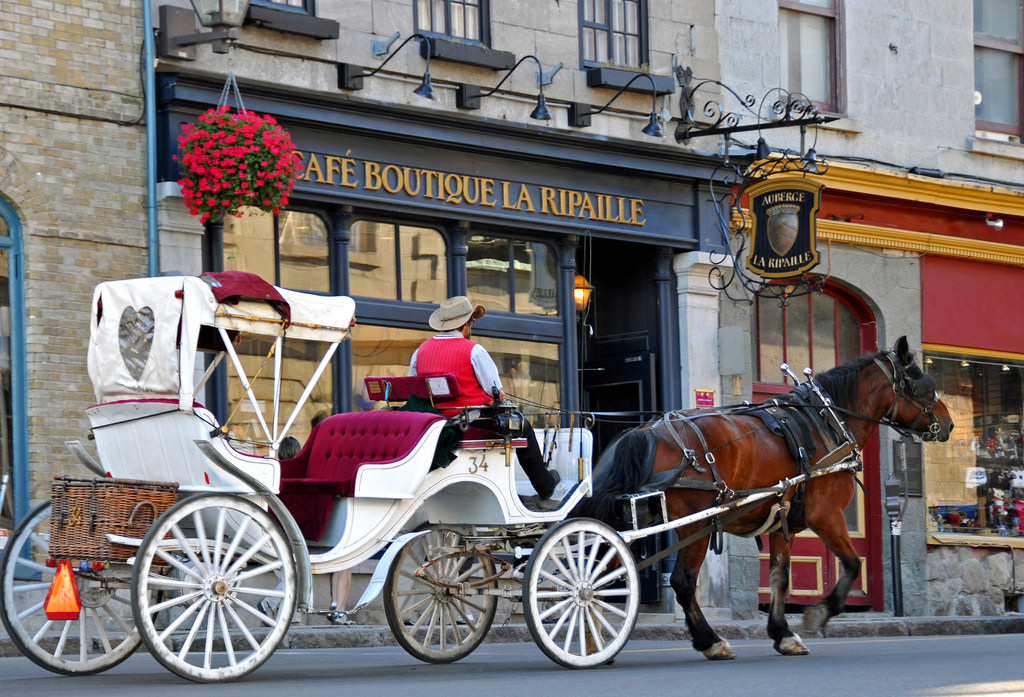
- Recent Posts
- What we learned from speaking with 1000+ residents of tourism destinations - 4 February 2022
- Your DMO’s role in the slow-motion tourism restart - 7 May 2020
- Manage mass tourism before it manages you - 22 March 2019
21 July 2016
1 comments(s).
Earlier, I wrote about the six things tourism businesses should know about their destination marketing organization (DMO) , and the response was massive. The article obviously hit a nerve. Since then, a few tourism operators have told me that they’d like their DMO to know some important things about them as well.
I’ve worked with, spoken to and corresponded with thousands of tourism operators over the last 15 years or so. I’ve led focus groups with general managers of large hotels, ran workshops with businesses in very remote communities and facilitated ideation sessions where whole towns participated. Through this experience, I’ve learned a lot. In the interest of helping DMOs and businesses communicate and collaborate, I’ll share some tips based on the common patterns that I have discovered.
Jori Kirk is one of the most inspiring operators I know. He operates two eco-adventure parks in Saskatchewan, Canada, won the 2014 Tourism Industry Association of Canada award, and now sits on the board of Tourism Saskatchewan. He’s an impressive and switched-on entrepreneur and I invited him to speak at one of our Social Media Tourism Symposium events. His brilliant “Find Your #HappyDance” presentation inspired parts of this post:
Here are eight things your DMO needs to know about its tourism operators.
1) most are small businesses, so get to know them.
If you’ve never operated a tourism business (I haven’t, either), you need to understand the context around how your operator partners work. Most operate small businesses and have to deal with sales, cashflow, HR, maintenance, etc., without much staff. On top of that, they often have family commitments. Running a business can be tough on them and very stressful. Larger operators also deal with many of the same challenges. So try to put yourself in their shoes. Use any opportunity you have to get to know them, their business, their challenges, their observations, and so on. It’s especially important to make this effort when your job doesn’t require a lot of contact. Ask questions, empathize, observe and learn. It will help you in your job because you will better understand the challenges operators face.
2) Operators have their own challenges and need to know that they are heard
Maintaining a genuine interest in and empathy with your operators is massively important. DMO staff can appear pretty formal, scripted and politically correct. Destination marketers use a lot of research and data to understand what’s happening, but remember, that data always represents a real impact on real people. Keeping a finger on the pulse and asking operators how things are going and where their challenges are brings the data to life, and shows them that you are looking after their interests. And of course you are, but not all operators truly see that.
3) Operators are a very powerful source of knowledge and creativity
I’ve learned that tourism operators are entrepreneurial, creative, resourceful, matter-of-fact and typically not shy. Involve your operators in everything do you, because magic will happen when you tap into this energy and channel it in the right way. Ask them for input and ask for feedback. Sometimes you won’t like what you hear, but in the end you’ll always be better off for it. More than ever, destination marketing is a collaborative effort between the DMO, operators and other stakeholders. It can’t happen in isolation.
4) The “little guys” are important
Every destination has the big tourism players – these are usually the large hotels and attractions that demand attention and often get it. And rightfully so, most of the time, because they are primary drivers of tourism. But be proactive and don’t ignore the small operators. It’s especially useful to include a broad spectrum of operators during any type of consultation. Smaller operators have different challenges and perspectives that are often really valuable to learn about. They are also often a lot more flexible and nimble in how they can implement new ideas.
5) Operators are busy, too, so keep that in mind when you ask for things
A DMO can appear very demanding to an operator. The business owner may hear many requests like, “Please update your web listing,” “Buy into this campaign,” “Can you comp this travel writer? ”, “Please join our event,” “Fill out this research survey,” and the list goes on. However, most don’t see a lot of direct return of any of this or never hear about any outcomes or results.
Before you ask an operator for anything, make sure you really need what you’re asking for and have a plan to communicate results/outcomes to close the loop. Give them some love back, even if it’s a small gesture. Like I said earlier, operators are busy and they have their own needs that you should also focus your efforts on.
6) They often don’t get enough insight into what you do
This is more common than you think. Operators don’t see a lot of evidence of what a DMO is doing, exactly. This is partly driven by the fact that promotion happens in different markets that they can’t always see, but that’s no reason not to tell people about it. If people don’t know what’s going on, they’ll make it up themselves. When I’ve asked operators what their DMO does, “nothing”, “not much” or “nothing productive” are not uncommon answers.

William Bakker, Chief Strategist at Destination Think
With modern communication tools, there’s really no excuse not to stay in touch regularly. DMOs should communicate more often and more effectively about what they’re working on. Of course, DMOs typically share information through industry websites, newsletters, events and more. But these messages are often often formal and kept at a high level. Get into the details. Share. But you don’t have to overproduce things.
7) They need to see a connection between your DMO’s strategy and their business success
Most DMOs are catching up with modern marketing strategies and are diversifying their budgets. But for operators, a lot of these strategies and tactics are foreign concepts. Marketing a destination is very different from marketing a business, so your DMO needs to take a long-term view. You need to communicate your plan in a way operators understand, buy into and support. Without their support, you won’t be successful.
8) DMOs can help make their operators stronger through education
In his presentation, Jori said that the worst thing a DMO can say to an operator is “let me know if you need anything,” because they don’t necessarily know what they need. Operators know that consumer behaviour and marketing is changing fast.
From designing socialgenic experiences to creating effective promotion plans, business owners often don’t know where to start or how to be 100% effective. They look to their DMO to help them keep up and assist with building their capabilities. You need to be there for them. Many DMOs conduct training sessions for their operators. They need to do more. Your operator’s marketing is a DMO’s marketing, and in an interconnected world, you need operators to maximize their efforts.
The bottom line is that destination marketing is a collaborative effort. Communication and collaboration are keys to success for your DMO and for your operators’ businesses. Destinations and operators need to play on the same team in order to make real impact.
Related reading: 6 things tourism businesses should know about their DMO
Featured image credit: Dennis Jarvis, Flickr
That was really informative; thank you and keep up the good work. We may even meet each other at some point. All the best from Epirus, Zagori, Greece.
Submit a Comment Cancel reply
Your email address will not be published. Required fields are marked *
Save my name, email, and website in this browser for the next time I comment.
Submit Comment
RELATED POSTS
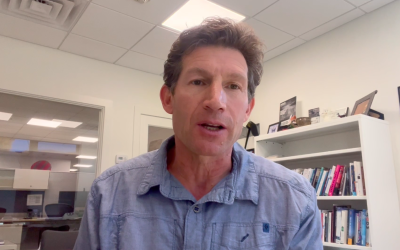
Corporate sustainability isn’t working: Here’s what the travel industry needs to do next
Mar 5, 2024
“You have a huge, powerful constituency that visits you. You can educate them and mobilize them, not to tell you not...

Cultivating connection: the role of Indigenous tourism in sustainability
Feb 20, 2024
“For me, the value, the sustainability and the value of Indigenous tourism is about my culture, my language, my...

Fighting “impact fatigue” to lead rural innovations: stories from Cariboo Chilcotin Coast
Feb 13, 2024
“One of the challenges that we've had in articulating sustainability and the values from the region is that those type...
You’ve found your partner for destination marketing
We work with the most innovative tourism boards in the world to create a vision for each of their destinations, solve business challenges and execute brilliant, integrated campaigns. The expertise we apply to that work is shared in the articles published here and in our DMO Matters newsletter.

Consent* Destination Think may store my data and contact me by email.*
Thank you! You will receive an email to confirm your subscription.
We value and respect your privacy. Click to read our privacy policy.

COMMENTS
Definition and Role of a DMO in Tourism. A Destination Management Organization (DMO) plays a vital role in the tourism industry by serving as the primary entity responsible for managing, promoting, and developing a destination. ... DMOs amplify their marketing efforts and ensure that the destination stands out in the competitive tourism ...
Why Should All Destinations Have a DMO? Destinations are always looking for ways to stand out from the competition, but to do so, they need both short and long-term strategies. And that's what all popular DMOs have. A destination management organization works with tourism boards and convention and visitors bureaus.
In the dynamic world of travel and tourism, a Destination Marketing Organization (DMO), also known as a tourism board, tourism authority or visitors bureau, plays a pivotal role in shaping the perception, promotion, and success of a destination.They employ a wide range of strategies to attract visitors, boost local economies, and create memorable experiences.
Discover Tourism Abbreviations: Dive deeper into a comprehensive list of top-voted Tourism Acronyms and Abbreviations. Explore DMO Definitions: Discover the complete range of meanings for DMO, beyond just its connections to Tourism. Expand Your Knowledge: Head to our Home Page to explore and understand the meanings behind a wide range of acronyms and abbreviations across diverse fields and ...
3. Who is in charge of a DMO? Most DMOs consist of a team of tourism professionals and stakeholders, which acts as an entity, working together to aid residents, local tourism businesses, and travelers. While the organization may have a titled "director," the particular roles and responsibilities of each DMO member are destination-based. Non ...
A destination marketing organization ( DMO) is an organisation which promotes a location as an attractive travel destination. DMOs are known as tourist boards, tourism authorities or "Convention and Visitors Bureaus". [1] They primarily exist to provide information to leisure travellers. Additionally, where a suitable infrastructure exists ...
While a DMO tries to stimulate greater demand for the local area, the marketing and expertise of DMCs bring local businesses in direct contact with tourists that are looking to spend money. Similar to the debate around the relevance of travel agents in the digital world, there have been discussions in recent times about the future of DMCs.
What is a DMO? The D in DMO stands for destination. A destination can take on a variety of meanings, whether it be it a city, national park, country or any other clearly delineated region. ... The tourism ecosphere is in the midst of a cultural change, and as sustainability in travel becomes evermore important, the M of DMO is transitioning ...
UN Tourism supports its Members and Destination Management/Marketing Organizations through the UN Tourism.QUEST - a DMO Certification System. UN Tourism.QUEST promotes quality and excellence in DMOs planning, management and governance of tourism, by means of capacity building.UN Tourism.QUEST Certification evaluates the three areas of key performance in destination management at DMO level ...
A brief history of your DMO's role. Destination marketing is undergoing a revolutionary change. For many, mass advertising fades in relevance as word-of-mouth promotion moves front-and-centre and DMOs begin to manage experiences. Your visitors and residents influence people who trust them by sharing their travel experiences in vast online ...
The DMO emerges as a key player in the development and management of tourism at the destination level with various functions. Depending on the potential needs, these functions may include strategic planning , implementation of the destination tourism policy, tourism product development , crisis management, quality improvement and assurance ...
Julie Saupe, CEO Of Alaska's Visit Anchorage, said that the DMO's shift to a destination-management model is a means of improving the Anchorage experience. "Ideally, it makes a community ...
A DMO (Destination Marketing Organization) is responsible for promoting a destination to potential visitors and creating a positive image of their location. A DMO is a non-profit organization that works with various stakeholders, such as local businesses, government agencies, and media to help boost tourism and create the best experiences for those who visit and host events.
Destination Management Organizations (DMOs) are up against an enemy of gigantic proportions: the COVID-19 pandemic. And many of these companies — which are also known as tourism boards or visitors and convention bureaus — have gotten scrappy when it comes to pivoting their promotional strategies and coming up with creative ways to stretch their marketing dollars, all while continuing to ...
DMCs elevate the traveler's experience, offering customized adventures, while DMOs showcase a destination's charm to the world, boosting tourism and local economies. Together, these entities create a synergy that benefits both travelers and the destinations they explore. DMCs craft unforgettable moments, while DMOs showcase the allure of these ...
2) A DMO isn't responsible for your sales. With a few exceptions, your DMO should focus their time and effort outside of selling things. It can be a waste of resources, as there will be a number of places to buy tour packages, flights and hotel rooms once someone makes the decision to visit. Since the existing organizations are often much ...
1 Comments (s) "DMO" typically stands for "Destination marketing organization," which has often been understood, in practice, to mean "promotion," one of the 4 Ps of Marketing. But times are changing. As Destination Think CEO Rodney Payne has said, "There has been a lot of discussion in recent years about destination marketing ...
A destination marketing organisation, or DMO, can help to add value to your destination by coming up with a comprehensive promotional strategy.
DMO stands for Destination Marketing/Management Organization. At times, the role of a DMO is mistakenly perceived to be limited to the marketing efforts, but in reality, DMOs contribute majorly to the development aspects of a destination too. Effectively, the UNWTO defines it as "the leading organizational entity which may encompass the ...
1 | Create Shareworthy Content On Your Blog. Travelers love listicles and sample itineraries that are easily digestible and shareable. Some DMO blogs are widely used by locals and tourists alike and have a steady stream of organic traffic, while other tourism boards help bolster their content's organic reach with paid media.
According to Booking.com, 53% of travelers reported that the pandemic opened their eyes to human impact on the environment, making them want to travel more sustainably in the future. In addition, 34% of travelers are looking for immersive, authentic experiences where they can travel like a local. For example, Contiki's younger demographic is ...
Here are eight things your DMO needs to know about its tourism operators. 1) Most are small businesses, so get to know them. If you've never operated a tourism business (I haven't, either), you need to understand the context around how your operator partners work. Most operate small businesses and have to deal with sales, cashflow, HR ...
of tourism will be more equally spread across a destination, and the DMO can ex ploit the situation for marketing purposes. Consequently, while delivering smart tourism experiences is an important ...